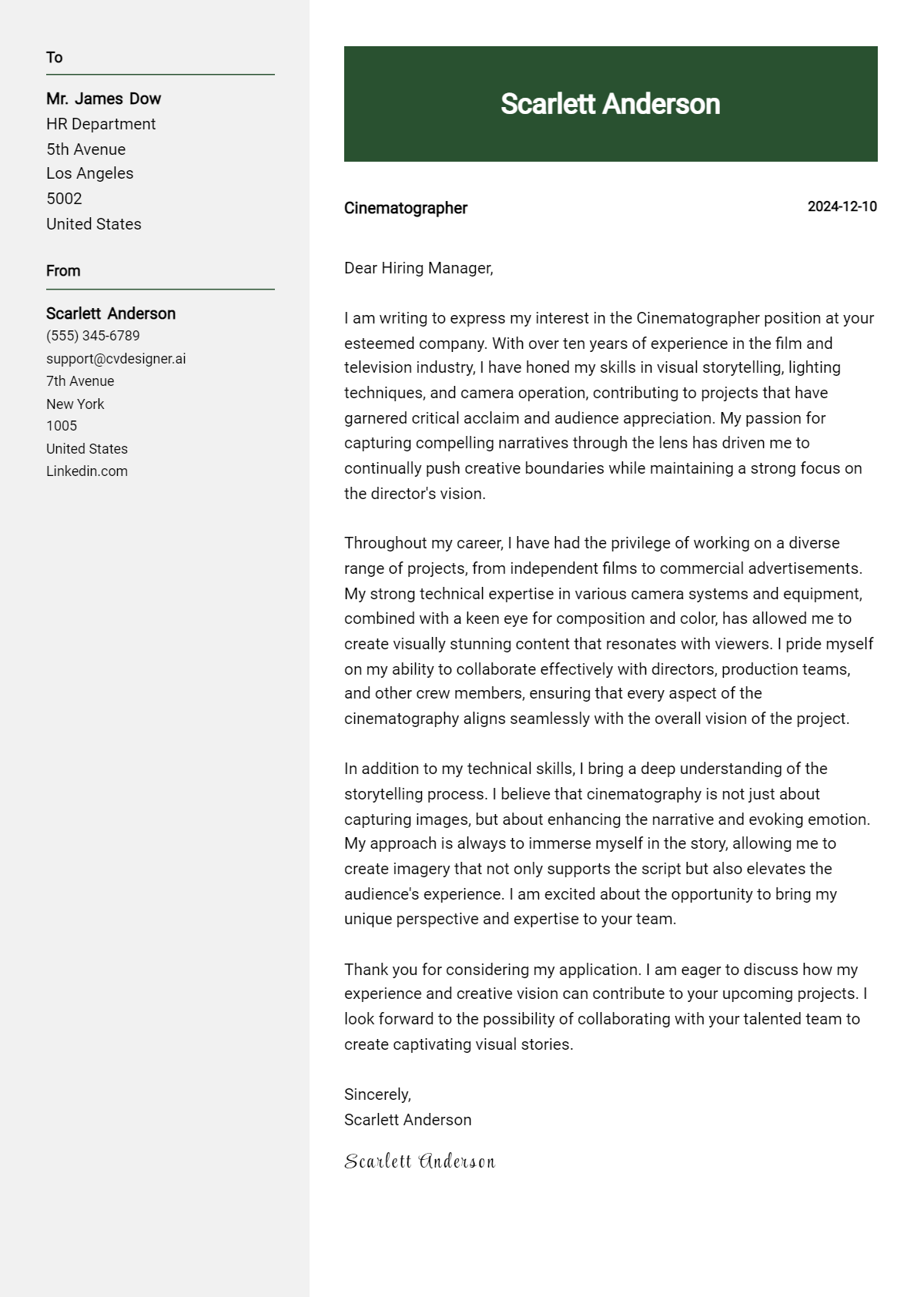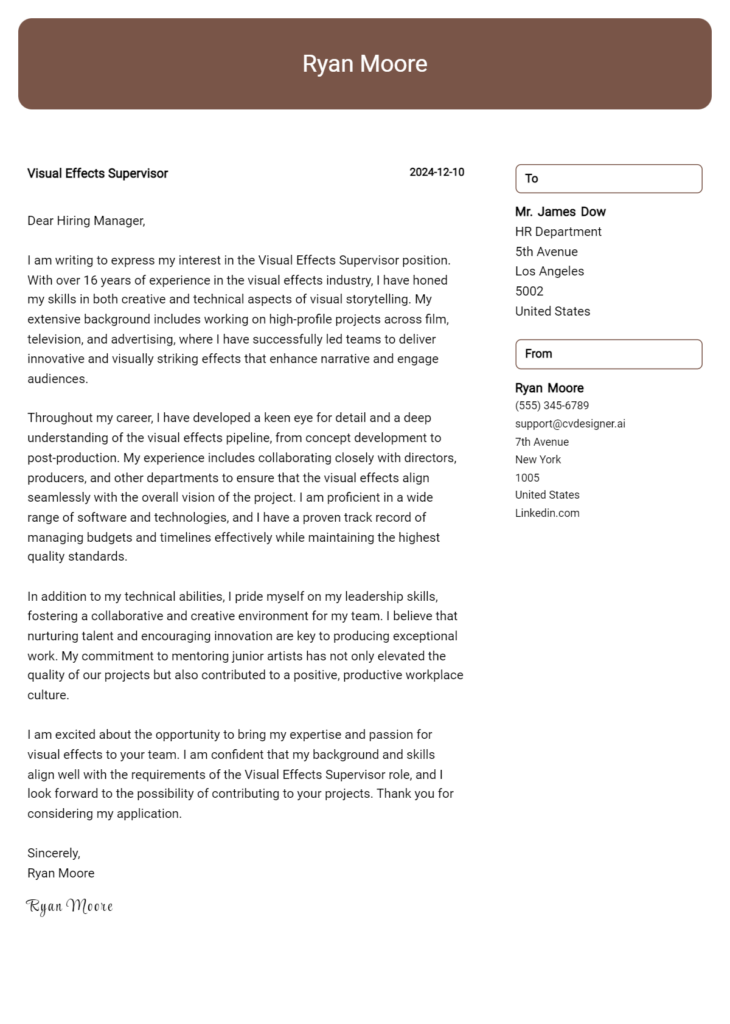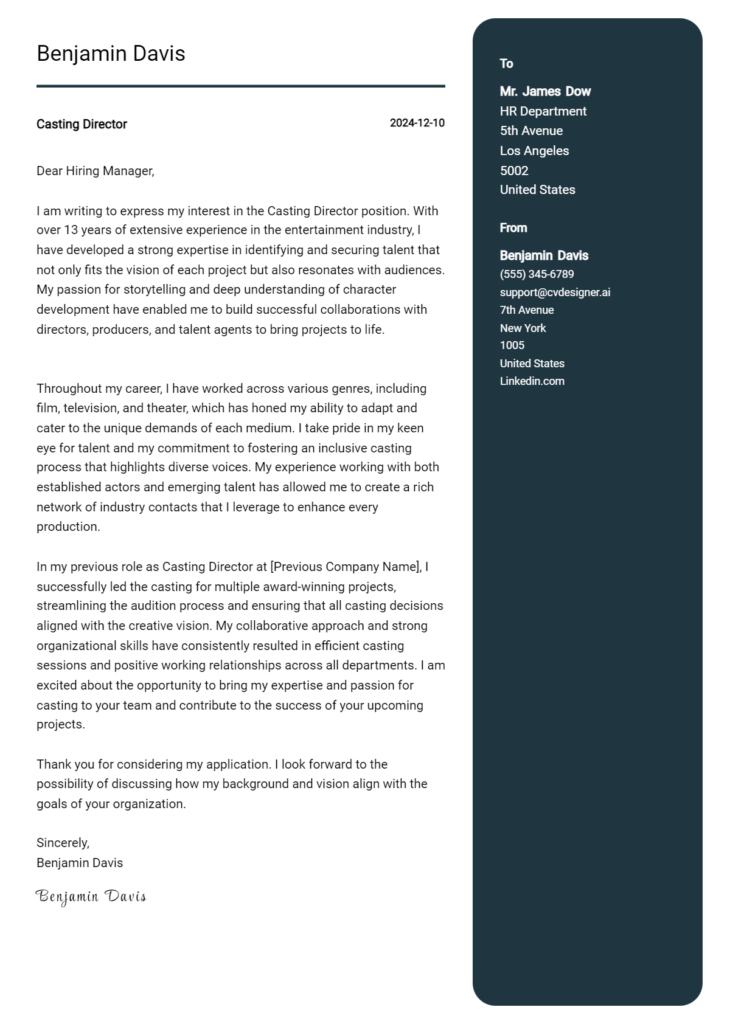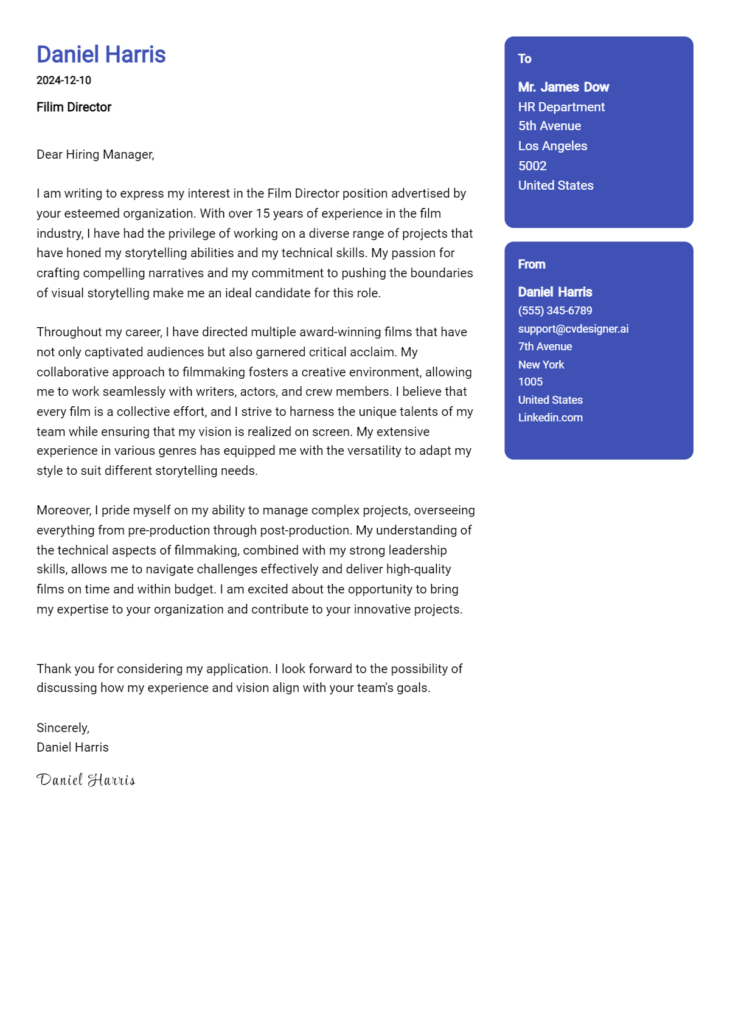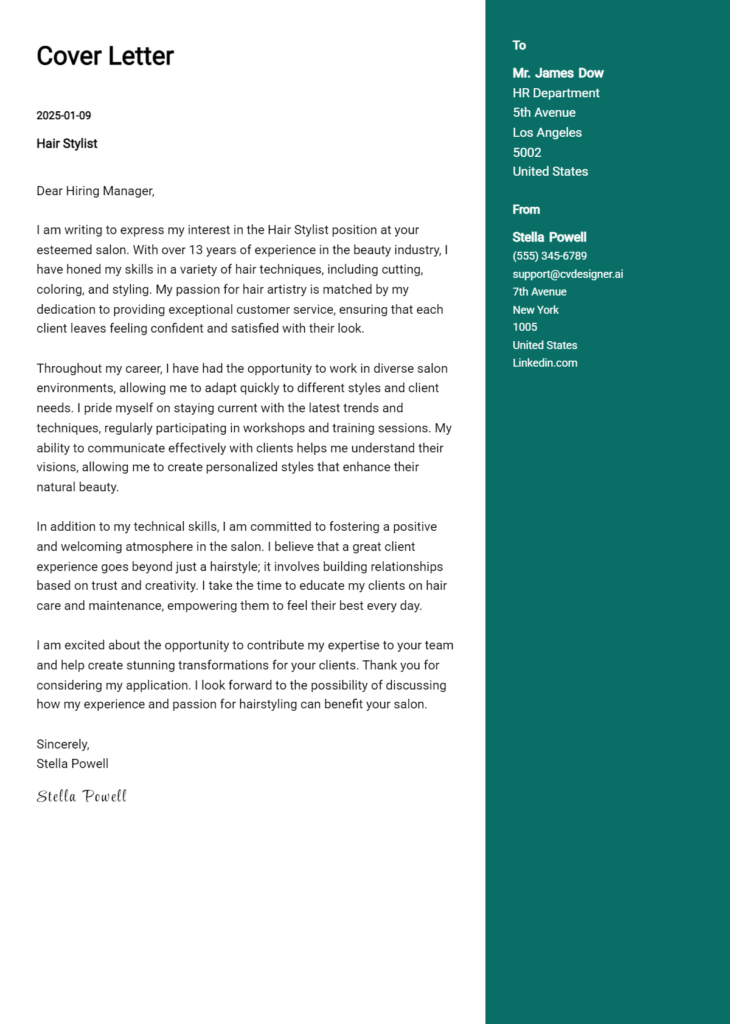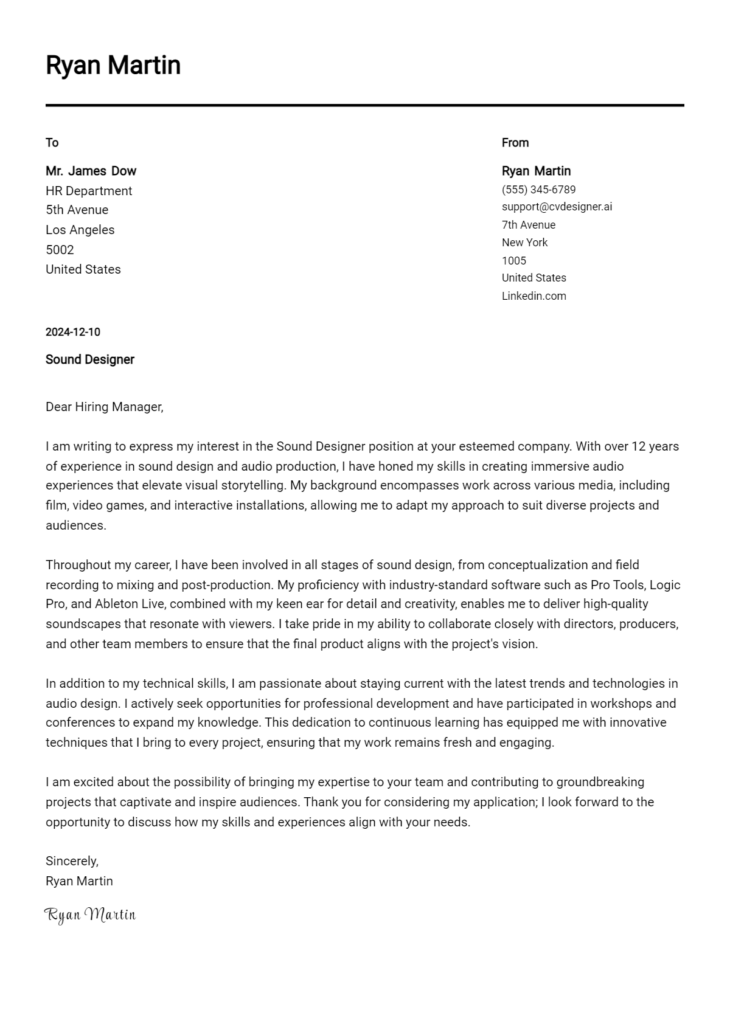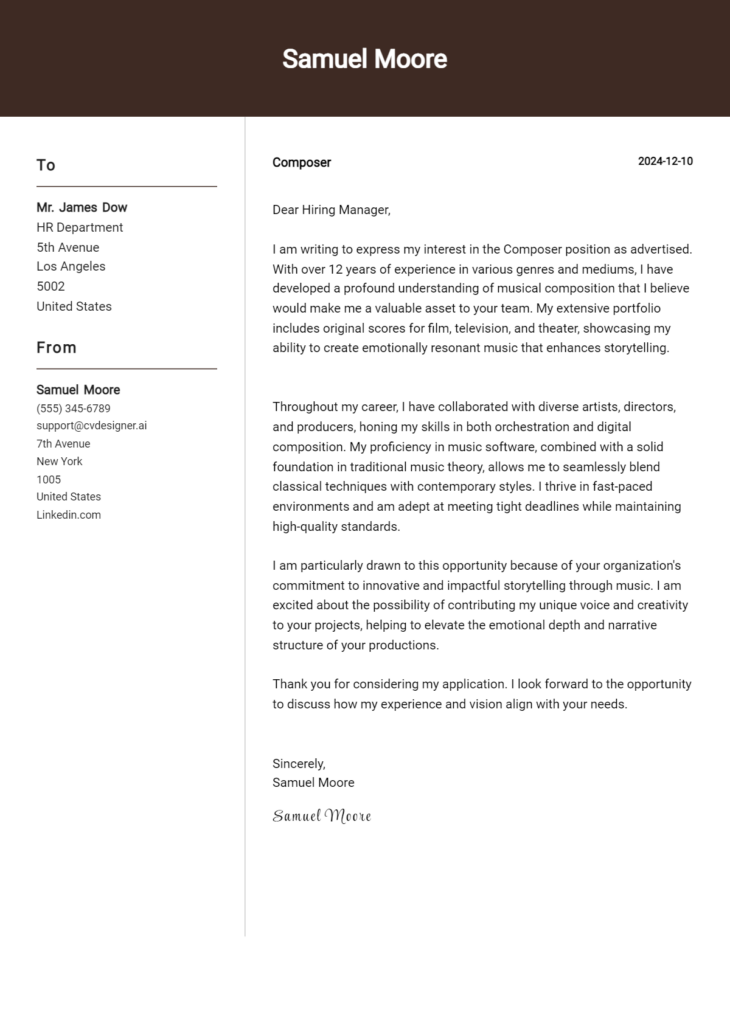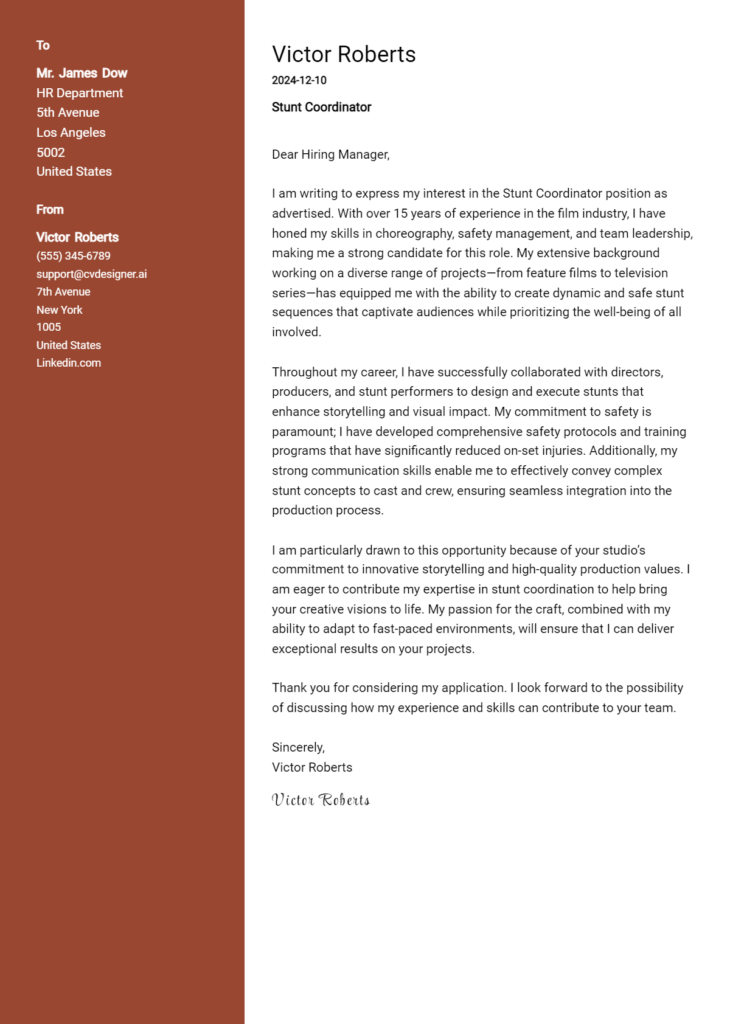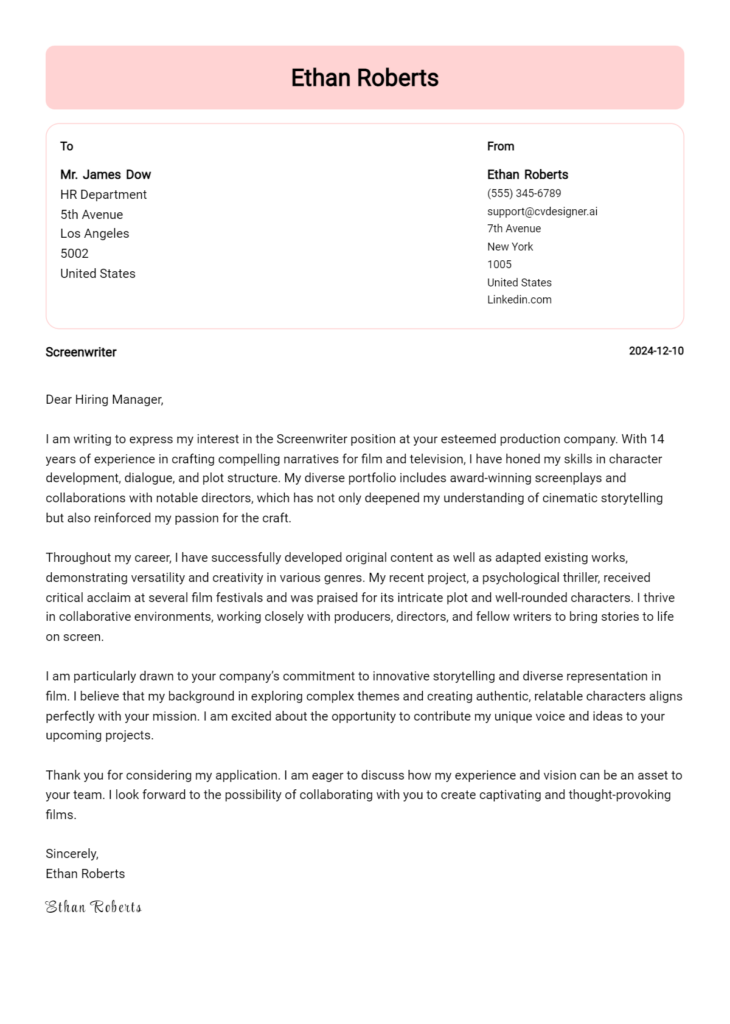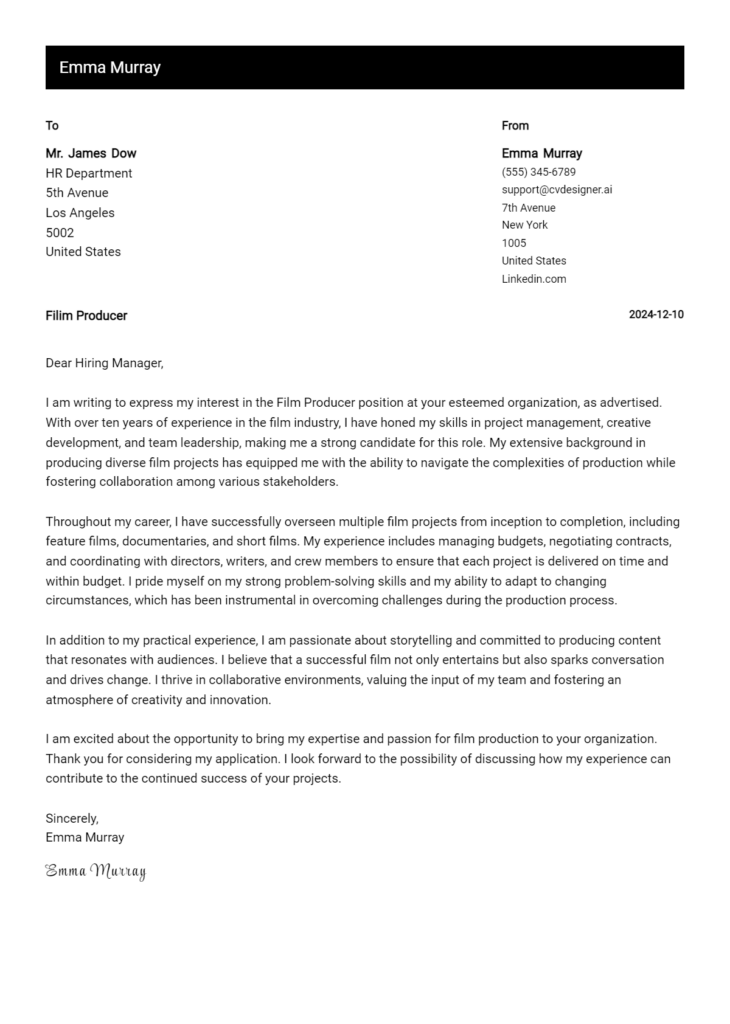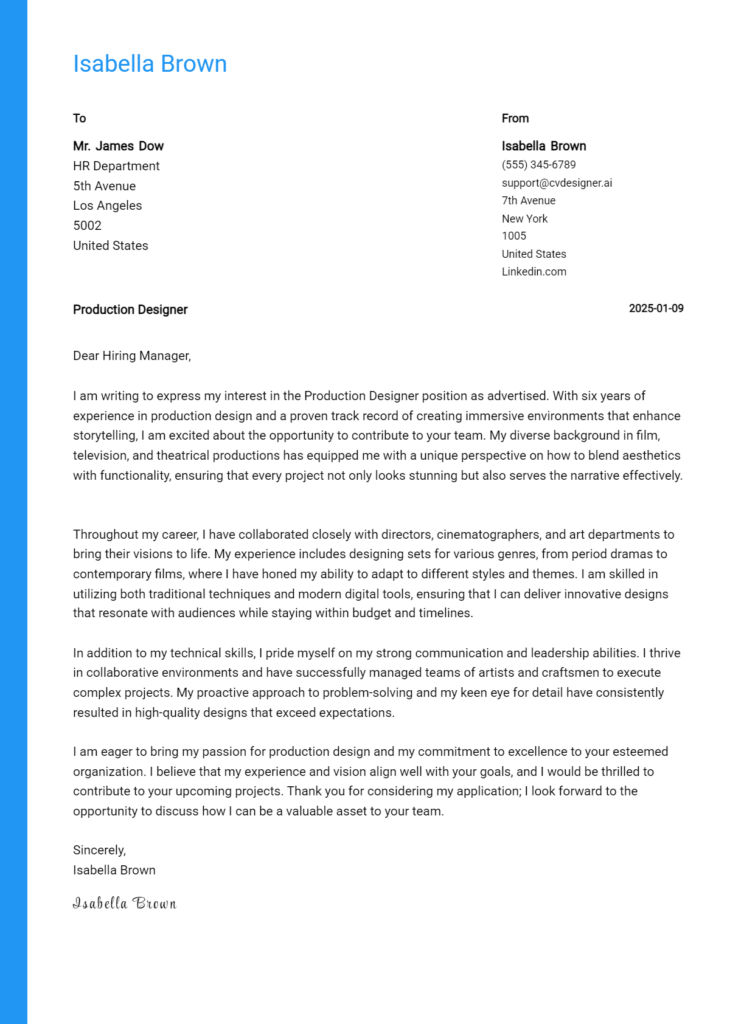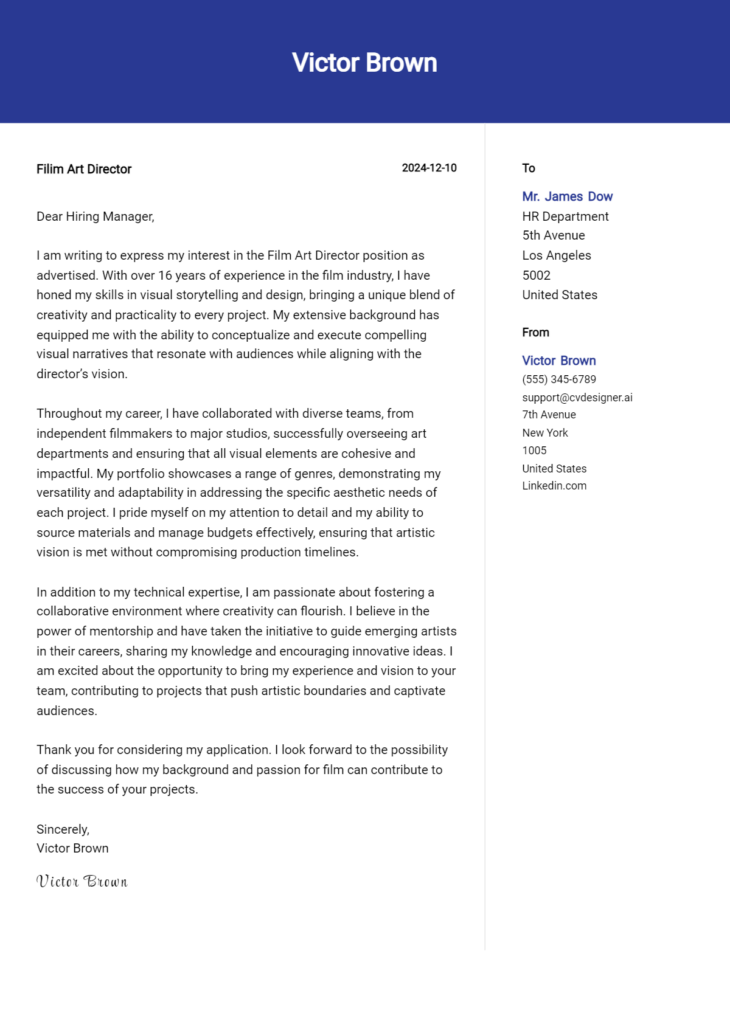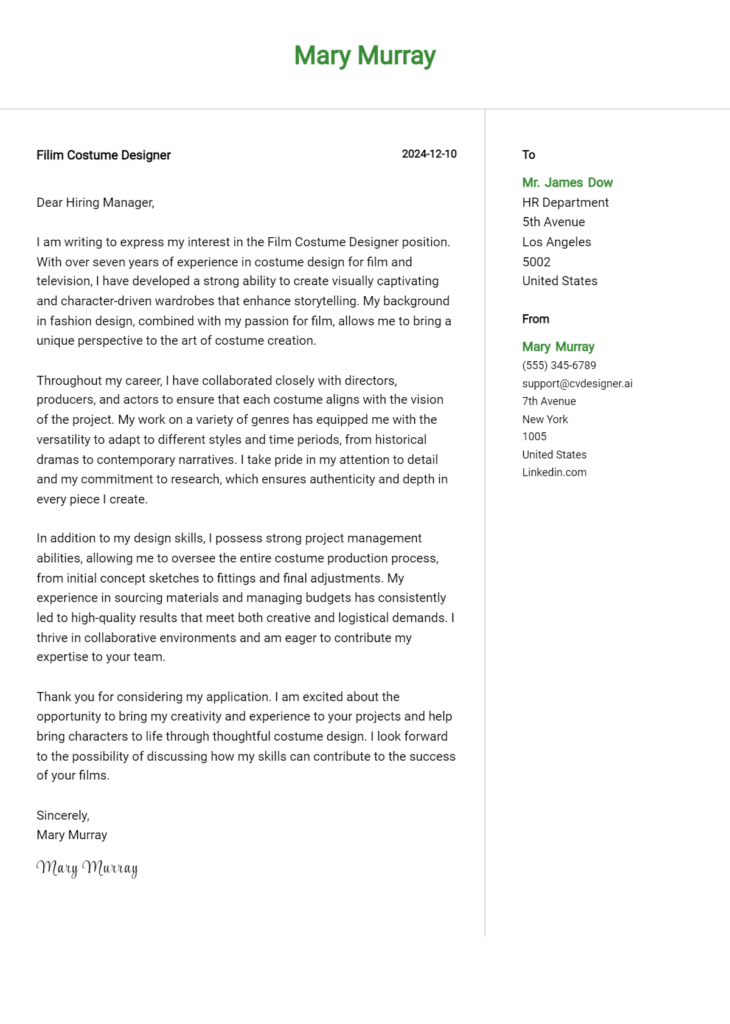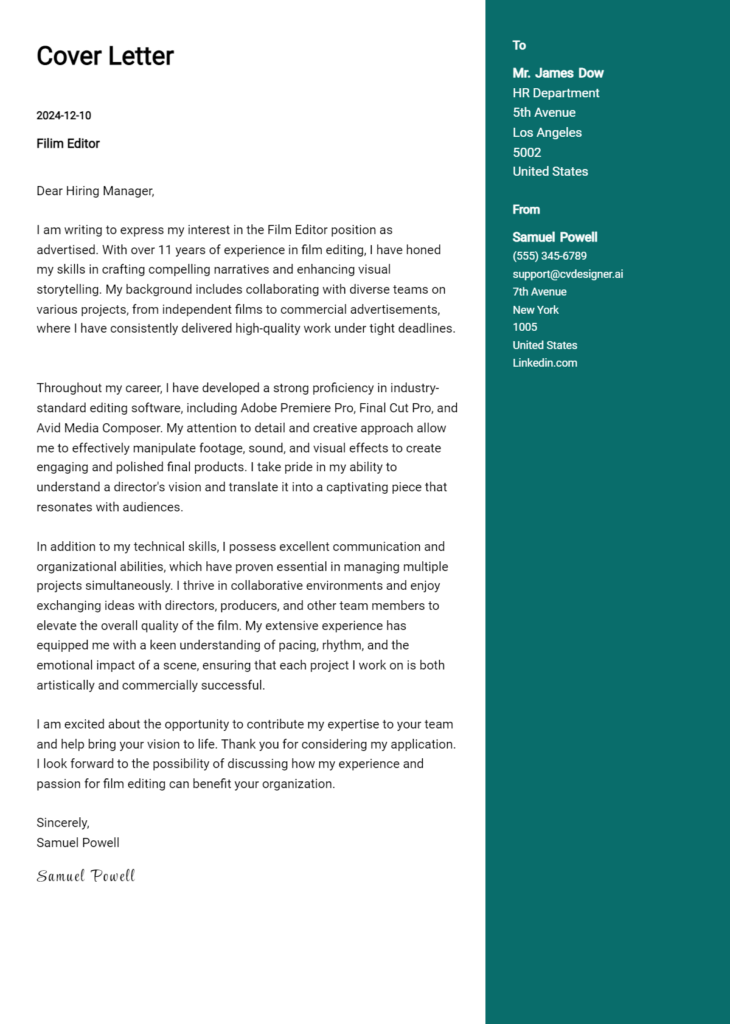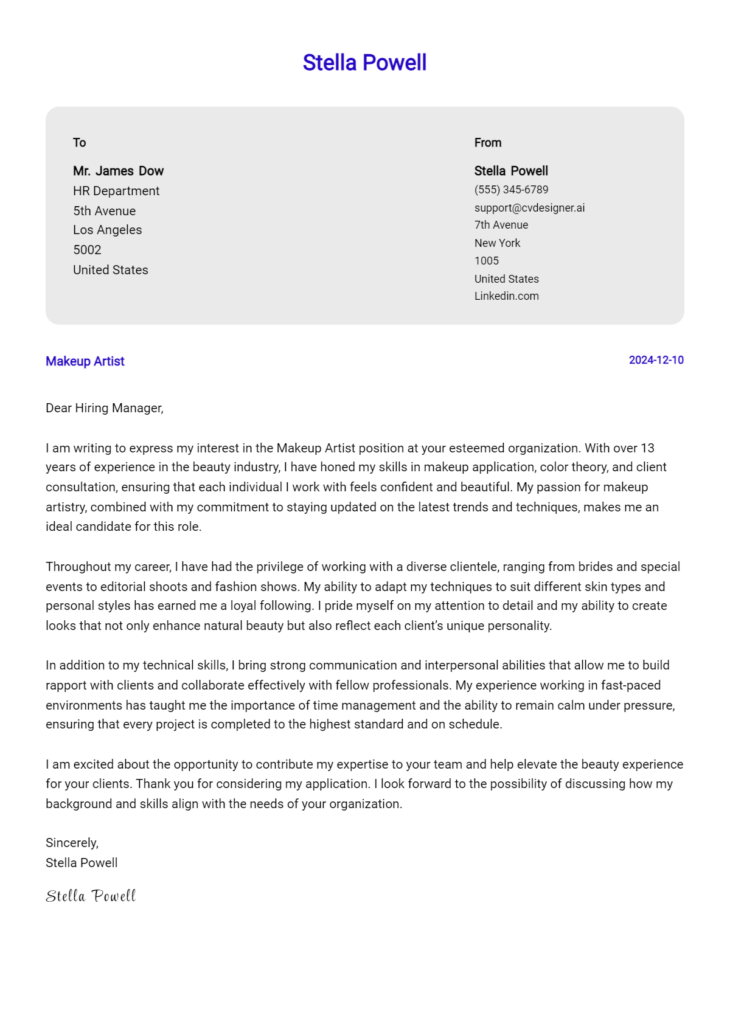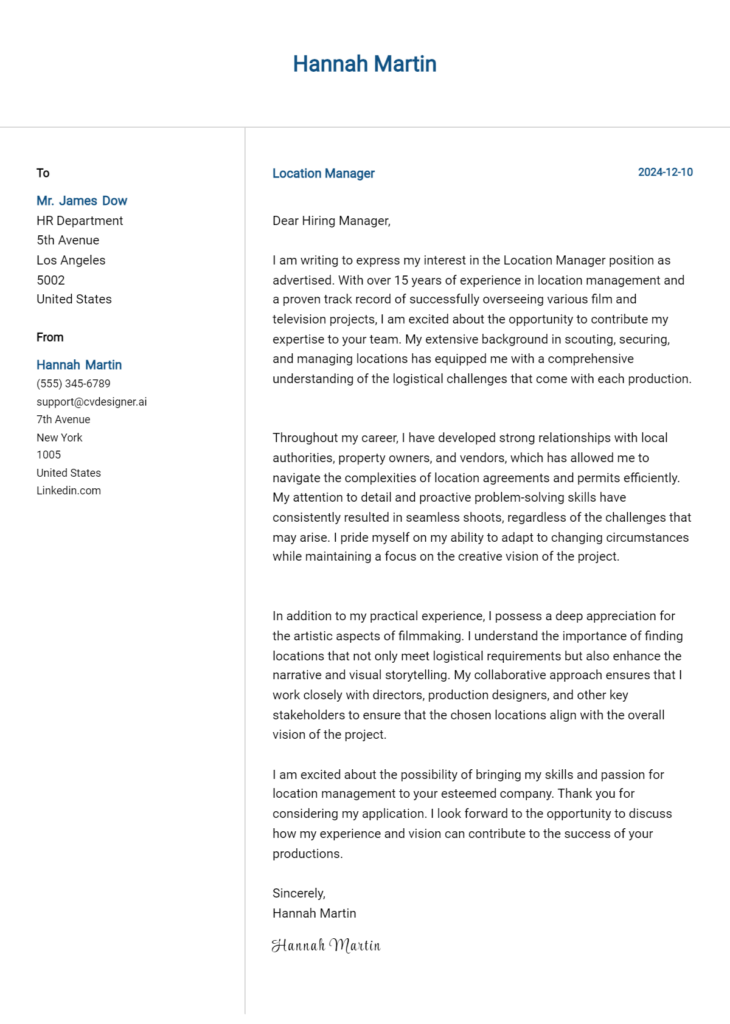Cinematographer Cover Letter Examples
Explore additional Cinematographer cover letter samples and guides and see what works for your level of experience or role.
How to Format a Cinematographer Cover Letter?
Crafting a compelling cover letter is essential for a Cinematographer, as it serves as your first impression to potential employers. Unlike many professions, cinematography is a visual art, and your cover letter should reflect your creativity and technical prowess. The way you format your cover letter not only showcases your professional qualifications but also demonstrates your understanding of aesthetics and attention to detail—key attributes in the film industry.
In this guide, we will discuss how to structure your cover letter effectively, providing insights and cinematographer-specific examples to help you create a standout document.
We will focus on the essential components of a professional cover letter, including:
- Cover Letter Header
- Cover Letter Greeting
- Cover Letter Introduction
- Cover Letter Body
- Cover Letter Closing
Each section plays a critical role in presenting your qualifications and artistic vision. Let’s break down each part and explain how to make your cinematographer cover letter shine.
Importance of the Cover Letter Header for a Cinematographer
The cover letter header is a crucial component of your job application as a cinematographer. It sets the tone for your professionalism and attention to detail from the very beginning. A well-organized header should include your contact information, the date of writing, and the recipient's details. This clarity not only helps the recipient easily identify you but also reflects your ability to present information in a clear and concise manner—an essential skill for any cinematographer.
A strong header can create a positive first impression, whereas a weak one may suggest carelessness. Here are examples of both:
Strong Example
John Doe 123 Film Lane Los Angeles, CA 90001 john.doe@email.com (123) 456-7890 October 15, 2023 Jane Smith Director of Photography ABC Productions 456 Movie St. Los Angeles, CA 90002
Weak Example
jdoe@email.com 10/15/23 Hi, I’m applying for the cinematographer position.
In the strong example, the header is clear and professional, while the weak example lacks essential information and demonstrates a casual tone that is unsuitable for a formal job application.
The Importance of a Strong Cover Letter Greeting for a Cinematographer
The greeting of a cover letter sets the tone for the entire correspondence and serves as the first impression a hiring manager will have of you. A well-crafted greeting not only demonstrates professionalism but also indicates that you have taken the time to personalize your application. By addressing the hiring manager directly, you establish a connection that can make your letter more engaging and memorable. To avoid generic greetings, it is essential to research and find out the name of the person responsible for hiring, if possible. A personalized approach reflects your genuine interest in the position and shows that you value the opportunity.
Strong Greeting Example
Dear Ms. Johnson,
Weak Greeting Example
To Whom It May Concern,
By following these tips and examples, you can ensure that your cover letter greeting effectively captures the attention of the hiring manager and sets a positive tone for the rest of your application.
The Importance of a Well-Crafted Cover Letter Introduction for a Cinematographer
A compelling cover letter introduction is crucial for a Cinematographer, as it serves as the first impression to the hiring manager. This opening paragraph should not only capture attention but also convey genuine interest in the position while succinctly highlighting relevant skills and achievements. A strong introduction sets the tone for the rest of the letter and can make the difference in whether your application stands out in a competitive field. Below are examples of both strong and weak cover letter introductions for a Cinematographer role.
Strong Example
Dear [Hiring Manager's Name], As a passionate Cinematographer with over seven years of experience in crafting visually captivating stories, I am excited to apply for the Cinematographer position at [Company Name]. My work on award-winning short films and documentaries has honed my ability to blend technical expertise with a creative vision that resonates with audiences. I am particularly drawn to [Company Name] because of your commitment to innovative storytelling, and I am eager to contribute my skills in lighting, composition, and camera operation to your next project.
Weak Example
To whom it may concern, I am writing to apply for the Cinematographer position. I have some experience in filming and have worked on a few projects. I think I would be good for this job because I like movies.
Purpose of the Cover Letter Body for a Cinematographer
The body of a cover letter for a Cinematographer serves as a vital platform for candidates to convey their unique skills, experiences, and the value they bring to a production company. This section allows the applicant to highlight specific projects or significant accomplishments that demonstrate their technical expertise and creative vision. For instance, discussing a successful collaboration on a feature film or a visually striking short film can illustrate the candidate’s ability to enhance storytelling through cinematography. The goal is to create a compelling narrative that not only showcases technical skills but also reflects a passion for the craft and a deep understanding of visual storytelling.
Strong Example
As a Cinematographer with over five years of experience in both narrative and documentary filmmaking, I have had the privilege of working on projects that have received critical acclaim. One of my most notable works was the short film "Echoes of Silence," which premiered at Sundance and won the Audience Award for its innovative use of lighting and composition. My expertise in operating various camera systems, including RED and Arri, combined with my proficiency in advanced post-production techniques, allows me to create visually captivating stories that resonate with audiences. I am eager to bring my artistic vision and technical skills to your team, contributing to projects that push the boundaries of cinematic storytelling.
Weak Example
I have some experience in cinematography and have worked on a few short films. I think I would be a good fit for your company because I like to work with cameras. I also know how to use editing software. I am hoping to find a job that allows me to grow and learn more about cinematography.
Importance of the Cover Letter Closing for a Cinematographer
The closing paragraph of a cover letter is crucial for leaving a lasting impression on potential employers. It serves as a final opportunity to summarize your qualifications, reiterate your enthusiasm for the role, and encourage the hiring manager to take the next steps, such as reviewing your resume or scheduling an interview. A strong closing can reinforce your fit for the position and demonstrate your eagerness to contribute to the project. On the other hand, a weak closing may leave the reader unmotivated to follow up, potentially costing you the opportunity.
Strong Example
Thank you for considering my application for the Cinematographer position. With my extensive experience in visual storytelling and a passion for bringing creative visions to life, I am excited about the opportunity to contribute to your team. I believe my skills in lighting, composition, and collaboration will significantly benefit your upcoming projects. I look forward to discussing how my background aligns with your needs. Please feel free to review my attached resume, and I hope to schedule an interview soon.
Weak Example
Thanks for reading my cover letter. I think I might be a good fit for your Cinematographer position. If you want, you can check my resume. Let me know if you have any questions.
Creating a compelling cover letter is an essential step for any aspiring cinematographer looking to land their dream job in the film industry. A well-crafted cover letter not only highlights your technical skills and creativity but also demonstrates your problem-solving abilities, understanding of the software development life cycle (SDLC), capacity for teamwork, and passion for continuous learning. These elements are vital in showcasing your qualifications and enthusiasm for the role. Here are some tips to help you write an effective cover letter that stands out.
Tips for Writing a Cinematographer Cover Letter
Highlight Your Technical Skills
Cinematography requires a robust set of technical skills, including knowledge of camera operation, lighting, and editing software. In your cover letter, be specific about the tools and technologies you are proficient in, such as Adobe Premiere Pro, DaVinci Resolve, or various camera systems. Providing concrete examples of how you’ve used these skills in previous projects can strengthen your case.Showcase Problem-Solving Abilities
Film production often encounters unexpected challenges that require quick thinking and adaptability. Share an example of a problem you faced on set and how you resolved it. This not only highlights your problem-solving skills but also illustrates your ability to remain calm and focused under pressure, which is essential in the fast-paced world of cinematography.Demonstrate Knowledge of SDLC
Understanding the software development life cycle (SDLC) can be an asset, especially if you work on projects that involve digital cinematography or post-production. Mention any experience you have with project management methodologies or tools that align with SDLC principles. This knowledge can differentiate you from other candidates and show that you are well-rounded.Emphasize Team Collaboration
Cinematography is rarely a solo endeavor; it requires collaboration with directors, producers, and crew members. In your cover letter, highlight your experience working in teams and how you contribute to a positive, productive environment. Mention specific projects where your teamwork made a significant impact on the outcome.Express a Passion for Continuous Learning
The film industry is constantly evolving, with new techniques and technologies emerging regularly. Convey your commitment to staying updated with industry trends through workshops, online courses, or film festivals. This shows potential employers that you are dedicated to your craft and eager to grow and adapt within the field.
By incorporating these tips into your cover letter, you can effectively convey your qualifications and passion for cinematography. If you need assistance in structuring your cover letter, consider using cover letter templates or a cover letter builder to create a professional and polished document.
Common Mistakes to Avoid in a Cinematographer Cover Letter
Crafting an effective cover letter is essential for standing out as a cinematographer, as it provides a first impression of your skills and creativity. Avoiding common mistakes can significantly enhance your chances of landing an interview. Here are several pitfalls to steer clear of when writing your cover letter:
Generic Language: Using a one-size-fits-all approach can make your letter sound impersonal. Tailor your cover letter to the specific job and company to demonstrate genuine interest.
Neglecting Formatting: A cluttered or incorrect cover letter format can be off-putting. Familiarize yourself with a proper cover letter format to ensure clarity and professionalism. You can find helpful guidelines here.
Focusing on Duties Instead of Achievements: Instead of listing job responsibilities from previous roles, emphasize your achievements and how they relate to the role you’re applying for.
Lack of Passion: Cinematography thrives on creativity and passion. Don't shy away from expressing your enthusiasm for the craft and the specific project or company.
Ignoring the Audience: Failing to consider the recipient’s perspective can lead to miscommunication. Research the company’s style and values to align your cover letter with their vision.
Omitting Visual Elements: As a cinematographer, your work involves visuals. Incorporate links to your portfolio or relevant work to showcase your skills effectively.
Spelling and Grammar Errors: Simple mistakes can undermine your professionalism. Always proofread your letter or use editing tools to catch errors before submission.
By avoiding these common mistakes, you can create a compelling cover letter that highlights your unique qualifications as a cinematographer. For more inspiration, check out various cover letter examples.
Cover Letter FAQs for Cinematographer
What should I include in my cover letter as a Cinematographer?
In your cover letter, emphasize your technical skills and creative vision. Begin with a brief introduction that highlights your experience in cinematography, mentioning any notable projects or collaborations. Discuss your proficiency with various camera systems and lighting setups, as well as your understanding of storytelling through visuals. Include specific examples of your work that demonstrate your unique style and versatility. Don’t forget to mention any awards or recognition you’ve received in the industry. Finally, express your enthusiasm for the position and how your skills align with the company’s vision. Tailoring your cover letter to the specific job will show your genuine interest and dedication.
How can I demonstrate my experience in a cover letter?
To effectively demonstrate your experience in your cover letter, start by outlining your career highlights and key projects that showcase your cinematography skills. Use concise yet vivid language to describe your role in these projects, focusing on the techniques you employed and the visual narratives you created. Quantify your achievements where possible (e.g., “shot over 50 short films” or “worked on a feature film that premiered at Sundance”). Additionally, mention collaborations with directors, producers, and other crew members to showcase your ability to work as part of a team. Tailor this section to reflect the requirements of the job you’re applying for, making it clear how your background aligns with their needs.
Should I include technical skills in my cover letter?
Yes, including your technical skills in your cover letter is essential for a cinematographer. Highlight specific camera systems you are proficient in, such as ARRI, RED, or Canon, and mention your expertise in lighting techniques, color grading, and post-production processes. Additionally, discuss any relevant software skills, like proficiency in Adobe Premiere Pro or DaVinci Resolve, as these are crucial in today’s filmmaking environment. By detailing your technical capabilities, you illustrate to potential employers that you possess the necessary tools and knowledge to execute their vision effectively. Be sure to connect these skills to your past work, demonstrating how they contributed to successful projects.
How can I convey my passion for cinematography in a cover letter?
To convey your passion for cinematography, begin your cover letter with a compelling personal anecdote or experience that ignited your interest in the field. Discuss what aspects of cinematography inspire you, such as storytelling through visuals or the technical challenges of capturing a scene. Use enthusiastic language to express your love for the craft and commitment to continuous learning and growth within the industry. Mention any personal projects or collaborations that reflect your dedication and creativity. Additionally, express your excitement about the specific opportunity you’re applying for, highlighting why you believe it aligns with your artistic vision and career goals. This genuine enthusiasm will resonate with hiring managers.
Build your Cover Letter in minutes
Use an AI-powered cover letter builder and have your letter done in 5 minutes. Just select your template and our software will guide you through the process.

